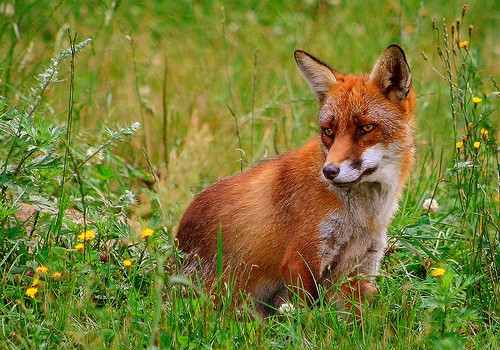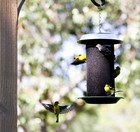Foxes, their Nature and How to Get Rid of Them Naturally
Nuisance Foxes and the Havoc They Make
Foxes
can be found on every continent around the world, except in Antarctica,
which shows just how widespread these tenacious and wily animals are.
It is interesting to note that they have been able to survive in
different climates around the globe and continue to thrive despite
building estates encroaching on their areas of habitat. However, many a
farmer and suburban dweller sees foxes as a nuisance.
Although shy, and seldom seen out in the open, they often come into conflict with man, with both the farmer and the suburban dweller. Foxes are given bad press for doing what comes to them naturally. They hunt to kill, they hunt to survive. This results in the loss of livestock for the farmer, who in turn loses out on potential food for himself and his family, and also results in loss of potential earnings. It also ends badly for people who keep chickens in their backyards.
There is a saying that goes, “If you have chickens, you have foxes.” And well I know it! I have lost countless chickens to Mr. Fox over the years, and have been forced many times to keep my girls locked up during the worst times where I was losing at least 1 girl a week when they were free ranging!
It is important to remember foxes have had to adapt to the world as humans have created it. They still have the same natural need to find food. If humans build towns on their natural habitats where are they supposed to live? Foxes will be naturally wary of humans and for a good reason. But for the most time, they come into close contact with humans and cause havoc on farms and in towns.
Although shy, and seldom seen out in the open, they often come into conflict with man, with both the farmer and the suburban dweller. Foxes are given bad press for doing what comes to them naturally. They hunt to kill, they hunt to survive. This results in the loss of livestock for the farmer, who in turn loses out on potential food for himself and his family, and also results in loss of potential earnings. It also ends badly for people who keep chickens in their backyards.
There is a saying that goes, “If you have chickens, you have foxes.” And well I know it! I have lost countless chickens to Mr. Fox over the years, and have been forced many times to keep my girls locked up during the worst times where I was losing at least 1 girl a week when they were free ranging!
It is important to remember foxes have had to adapt to the world as humans have created it. They still have the same natural need to find food. If humans build towns on their natural habitats where are they supposed to live? Foxes will be naturally wary of humans and for a good reason. But for the most time, they come into close contact with humans and cause havoc on farms and in towns.
A red
fox sitting in a field.
Fox Facts and The Nature of the Fox
Foxes
are generally solitary animals. They are also quite territorial and
will often live in the same area for life. A male will provide for a
female and pups when the babies are young. But once they are old enough
to venture out, the male will no longer assist. Once they are fully
grown they will develop very good night vision which is ideal for their
hunting nature.
Foxes are mostly active from dusk until early morning, therefore hunting mainly at night, although occasionally they will make a killing during the day depending on how hungry they are. They are naturally shy and will try and stay away from people and noise as much as possible.
Foxes are scavengers. They are not too picky when it comes to a meal, if they find food by scavenging they will take this option over hunting. It is much easier and takes less energy than competing with other foxes for their prey. They do not waste food and are often known to bury their findings and come back for it at a later date if they need it.
Foxes are mostly active from dusk until early morning, therefore hunting mainly at night, although occasionally they will make a killing during the day depending on how hungry they are. They are naturally shy and will try and stay away from people and noise as much as possible.
Foxes are scavengers. They are not too picky when it comes to a meal, if they find food by scavenging they will take this option over hunting. It is much easier and takes less energy than competing with other foxes for their prey. They do not waste food and are often known to bury their findings and come back for it at a later date if they need it.
Signs you have Foxes
If
you want to know if there are foxes in your area, look for signs such
as unusual droppings or tracks. They might dig up your garden or lawn,
looking for a meal. They can also be quite vocal, more so at certain
times of the year, especially in late fall.
Foxes in your Gardens
Some
people love to observe foxes and see them in their garden. These are
people who do not have livestock or poultry to lose! You can buy
special food for foxes if you wish that will attract them to your
garden, however this could attract unwanted rodents such as rats, and
so best to leave well alone.
If you start feeding a fox you are really inviting trouble. They will come and upset your rubbish bins looking for food if you forget to put any out, and in general make a nuisance of himself, and proving a danger to your neighbors who do keep poultry.
Therefore, it is very important to consider how you are disposing of your food waste as leaving it unattended could enable foxes to cause a mess and a smell that you will be spending days trying to get rid of!
If you start feeding a fox you are really inviting trouble. They will come and upset your rubbish bins looking for food if you forget to put any out, and in general make a nuisance of himself, and proving a danger to your neighbors who do keep poultry.
Therefore, it is very important to consider how you are disposing of your food waste as leaving it unattended could enable foxes to cause a mess and a smell that you will be spending days trying to get rid of!
Getting Rid of Foxes the Natural Way
I
am not an advocate of fox hunting. I am one of those people who enjoy
seeing deer in my forest, wild boar with their babies, and even foxes
in their habitats, despite my poultry loses. But
that
doesn't mean that I want foxes on my property! I don't!
If you do not want foxes in your garden, you can equally buy deterrents which will keep foxes away but will not harm them. However, one can often buy these products and find that the do not always work.
I use a natural method of getting rid of foxes that does work; human hair. Every so often I go down to my local hairdresser and pick up a bag of hair. I then place it in nylon stocking legs, and tie these to the boundary fence of my chicken pen. I have found this very successful in keeping foxes away, and replace the hair every couple of months.
Of course, wildlife abounds everywhere, from the birds in our gardens keeping the insect population down, to squirrels, foxes, deer, boar etc. Some we want to encourage, and some we definitely don't want to encourage! Foxes we don't want, birds we do. Not only for their lovely birdsong, but also for their usefulness in keeping the insect population down.
See our other sections on country animals, including our section on birds in your own backyards and what to feed them.
If you live in the UK and you are looking for a bird seed supplier Living with Birds not only sells bird seed, but also bird feeders (including the iconic Squirrel Buster® feeder preventing squirrels from pinching the birdseed) and other supplies to take care of the wildlife in your garden.
If you do not want foxes in your garden, you can equally buy deterrents which will keep foxes away but will not harm them. However, one can often buy these products and find that the do not always work.
I use a natural method of getting rid of foxes that does work; human hair. Every so often I go down to my local hairdresser and pick up a bag of hair. I then place it in nylon stocking legs, and tie these to the boundary fence of my chicken pen. I have found this very successful in keeping foxes away, and replace the hair every couple of months.
Of course, wildlife abounds everywhere, from the birds in our gardens keeping the insect population down, to squirrels, foxes, deer, boar etc. Some we want to encourage, and some we definitely don't want to encourage! Foxes we don't want, birds we do. Not only for their lovely birdsong, but also for their usefulness in keeping the insect population down.
See our other sections on country animals, including our section on birds in your own backyards and what to feed them.
If you live in the UK and you are looking for a bird seed supplier Living with Birds not only sells bird seed, but also bird feeders (including the iconic Squirrel Buster® feeder preventing squirrels from pinching the birdseed) and other supplies to take care of the wildlife in your garden.
Did you find this page helpful?
Sharing is a way of saying, "Thanks!"
Follow Us and Keep Up to Date
Don't miss out on our latest news and articles. Sign up for our free monthly e-zine!
Go from Foxes back to Country LivingGo back to the Home Page







New! Comments
Do you have something of value to add? Leave me a comment in the box below.